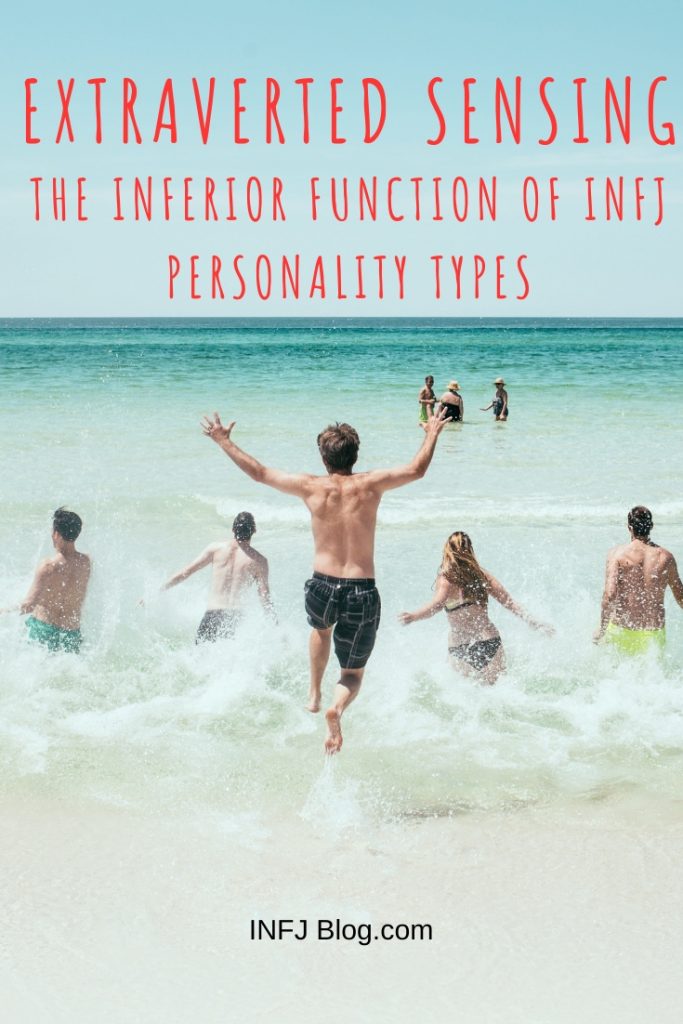Extraverted Sensing: Inferior Function in the INFJ Personality Type

What is Extraverted Sensing? And what does it look like as the inferior function in INFJ (and INTJ) personality types?
What is Extraverted Sensing?
Extraverted Sensing is an extraverted, perceiving function, which means it explains how we perceive our external environment and how we interact with people, places, and things in the outside world.
According to the MBTI®, INxJ types perceive through the lens of Introverted Intuition as a dominant function and Extraverted Sensing as an inferior function.
Neither of these functions are decision-making functions — they’re instead focused on how we soak in our inner and outer worlds.
As an INFJ, my Extraverted Sensing (Se) function is most apparent to me when I’m outdoors, just standing and soaking in the trees or a sunset or something around me — fully appreciating the moment.
Nine times out of 10, I’m not doing that. Even when I should be, I’m stuck in my head. But when I can and do access Se, it’s a breath of fresh air. It just feels good to be in the moment.
At it’s best, Extraverted Sensing is extremely observant, quick to act, and good at improvising. It’s open-minded, it likes to take risks in the person’s environment, and it prefer a hands-on approach to learning more than soaking in abstract concepts.
“At it’s best, Extraverted Sensing is extremely observant, quick to act, and good at improvising.”
INFJBlog.com
Extraverted Sensing as an Inferior Function
As an inferior function, Se shows up in a more childlike way.
It can sometimes be repressed, but it still shows up when it’s needed. However, it will appear a bit more clumsy or naive in use than it does in someone with a dominant, auxiliary, or even tertiary Se.
Someone with inferior Se may try to overcompensate for their lack of skill by getting really good at a single Extraverted Sensing activity. This could be a sport or skill such as cooking.
This skill would likely come at the expense of expertise in other sensory activities — or they might just be kind of “adequate” at most things.
Many times, our inferior function is what makes us “cute” in the eyes of loved ones. This is because we appear clumsy or adorable in how we engage with this part of our personality.
“Many times, our inferior function is what makes us “cute” in the eyes of loved ones. This is because we appear clumsy or adorable in how we engage with this part of our personality.”
INFJBlog.com
For example, the INFJ may be completely blind to something in their external environment until some else points it out. Once at a former job, a new co-worker asked me why another co-worker kept stuffed animals on their shelves.
I responded, “what stuffed animals?” The new co-worker laughed and asked, “how could you not notice them? You’ve been here for a year!”
My initial reaction was to feel insecure and dumb — “how did I not notice that?” Often times when inadequacy in the of use of our inferior function is pointed out to us, we feel self-conscious about it. It can feel like everyone else in the world is a natural in a skill we lack.
But when we own it and learn to laugh it off, people are more likely to see it as endearing rather than lacking intelligence.
Remember, everyone has an inferior function — no one is an expert at everything. You have skills in areas that other people envy. So don’t let your inferior function keep you down.
For an INxJ type, learning things that involve quick, external action won’t come easily. These types need more time to prepare and process how they’re going to engage with the outside world.
With enough preparation and practice, they can improve in the skill, but they may feel frustrated that it’s not something that comes as easy for them as it does for other people.
If they don’t prepare and practice the skill, it will be very obvious to everyone that they lack skill in that area.

What Inferior Extraverted Sensing Is Not
There are many misconceptions when it comes to how INxJ types use (or don’t use) their inferior function. Here are some of the most common misconceptions.
Inferior Extraverted Sensing Is Not Laziness
I’ve seen INxJs share that they’re lazy because they have inferior Extraverted Sensing. This is a common type-related excuse for laziness, but it’s not accurate as a trait of the inferior function.
Let’s face it — no one likes to go to the DMV or get their oil changed. Not even dominant Se users. Why? Because it’s not a fun experience.
Anybody can be lazy. INxJs shouldn’t use their inferior function as a scapegoat for not getting stuff done.
INxJs with anxiety can be overly focused on Se, which can cause them to get quickly overwhelmed by menial tasks, like answering emails or doing chores.
But that’s more linked to anxiety and not the inferior function itself.
When INxJs feel healthy and are using their Ni-Se processing in healthy ways, they can actually be extremely productive. Yes, even when it comes to the boring stuff.
Inferior Extraverted Sensing Is Not High Sensitivity
Many INFJ personality types also relate to being highly sensitive (HSP).
It makes sense that some INxJs would link the experience of being highly sensitive to their inferior function.
HSPs are easily overwhelmed by external stimuli. This sensory input includes things such as bright lights, stimulants like caffeine or alcohol, strong smells, loud noise, and more.
However, there is no direct link to being highly sensitive and having inferior Extraverted Sensing.
In fact, many INxJ types don’t relate to HSP descriptions at all. And, of course, many other personality types do have highly sensitive characteristics — even those with dominant or auxiliary Se!
Accepting Your Inferior Extraverted Sensing
Your inferior function will forever be a source of some pain. It’s never fun to accept that we can’t be good at all the things, all the time.
But accepting your inferior function doesn’t mean repressing it or never developing skill around it. In fact, when paired with your dominant function, Introverted Intuition, Se can express itself in ways that encourage your natural gifts.
Many INxJs who have worked on developing this Ni-Se connection have a strong mind-body connection. They are skilled at using their intuition to recognize patterns and their sensation to pick up on subtle cues in the mind or body’s reaction to stimuli.
This can make INxJ types gifted healers, or practitioners of crafts like meditation, dream interpretation, or yoga.
While activities that require quick improvisation may never come easily to an INxJ, that doesn’t mean that inferior Se is a curse. Your unique personality type is a gift. And the more comfortable you become with knowing and accepting what it means, the stronger and more capable you become as a person.
What does inferior Extraverted Sensing look like for you? Share your experiences, stories, or questions in the comments!
Enjoy this article? You may also like:
Tags
About The Author
Megan Malone
Related Posts
INFJ Cognitive Functions Compared to Each Type
When learning about your personality type, it’s important to have an accurate understanding of…
June 30, 2017The 8 Cognitive Functions and How INFJs Use Them
Understanding the wiring of the personality type means diving deeper into type theory. In this…
January 14, 2015


SEO Reseller Program | 29th Jan 20
Awesome post! Keep up the great work! 🙂